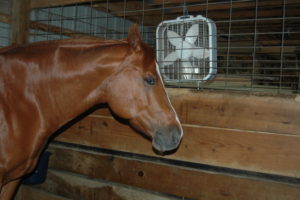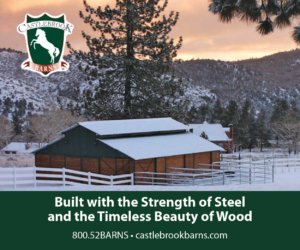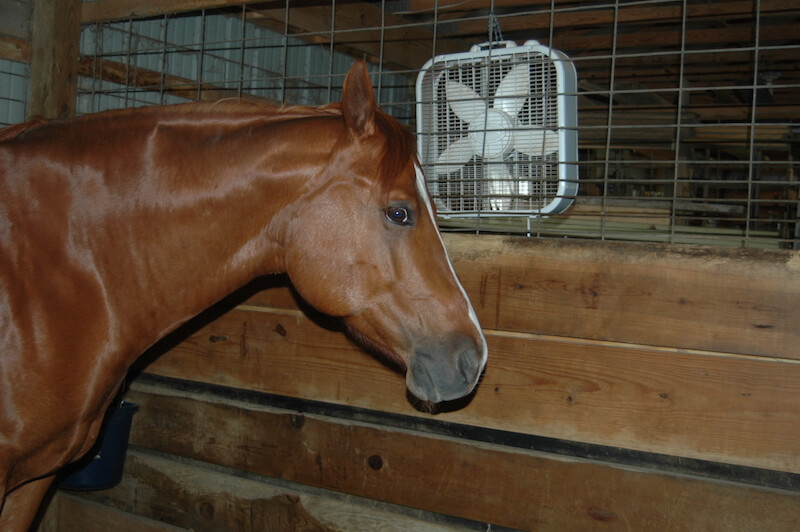15 Safety Tips for All Seasons
by Laurie Cerny
Author’s note: In November our barn, with which I have taken every safety precaution possible, could have burned down. Had I not ridden that morning I may have not noticed that a spot on an electrical outlet in our bathroom (where I keep our bridles) looked larger then when I’d seen it the night before and thought it was just a dirt mark. When I touched the spot it was like touching a hot stove. Immediately I turned the power off and called the fire department. Upon examination, the fire chief determined that the outlet was faulty. The amount of melting on the socket and inside the wall indicated to him that the wall would have been on fire within an hour. I was horrified by the close call, yet thankful for my Type A personality ( just the day before a friend told me I was over-the-top about being careful when it comes to the care of my horses, etc.). I also believe there was a guardian angel with me that day, prompting me to ride when I did.
A barn fire is every horse owner’s fear. And with so many potential fire hazards within your barn – from flammable grooming products to wiring and sockets and outlets within a live animal’s reach – it’s a wonder there aren’t more fires each year. Even worse, there’s always the chance that hay stored in the barn may not be fully dried and cured, which could cause it to heat up and combust. Last, but not least, more than one barn has burned down when electrical wires (not encased in conduit) were exposed after a horse, dog, cat, or mouse chewed through them. Here are some tips for preventing a barn fire:
- Keep combustibles – especially large amounts of gasoline, and other fuels, out of horse barn whenever possible. Also, store other flammables like fly sprays and grooming products away from any heat or electrical sources.
- Always have a licensed and insured electrician do any electrical work in your barn and have wiring, sockets, etc, checked periodically. In between these checks, inspect exterior plugs for any unusual heat, as well as heat in the walls surrounding them.
- If you ever notice an electrical socket that is loose, or a light that flickers (even if it’s a new bulb) have it checked by an electrician. If you detect heat around the switch or socket turn the power of immediately and call the fire department.
- Unplug electrical devices in advance of a thunderstorm. This includes fans, radios, automatic waterers/heaters, and fence chargers.
- Consider using solar charges and waterers.
- Inspect water heaters for any loose or damaged wires or connections, and test before using; check daily during the winter. Heat lamps, heat tape, and heaters should be used with caution.
-

Keep fans out of reach of horses. Photo credit Laurie Cerny Clean fans and blow out motors several times throughout the summer. Try to alternate fans during really hot weather in order to prevent motors from overheating. Always make sure fans, as well as their cords, are well out of reach of horses.
- Wiring in barns – especially in areas in reach of horses, should be in conduits.
- Light bulbs located in stalls and tie areas should be located out of a horse’s reach; they should also be protected by a wire cage (this will protect a ceiling light if a horse rears).
- Never use water near electrical outlets. Any outlets located near waterers, wash racks, and in bathrooms should be ground fault protector outlets.
- Storing hay in your horse barn is problematic for two reasons: if damp it could heat up and start a fire and in the case of a fire, a stack of hay will quickly burn.
- Clean your barn on a regular basis removing trash, empty grain and sawdust bags; clean cobwebs from around lights and sockets, etc.
- Use of extension cords for extended periods of time – especially with large volt tools and appliances, is never a good idea. If you feel heat in the cord it means the voltage is too high for the cord.
- Always unplug power tools, clippers, and other appliances when not in use.
- Do not burn or grill too close to barn. Welding or using a propane torch is another task that shouldn’t be done inside your barn.
In addition to these prevention tips, always keep a fire extinguisher in the barn as well as a water source (for non-electrical fires). However, according to FEMA, “Never use water on a fire unless you know what is burning. Water conducts electricity which could spread the problem and cause more shorting in the equipment. Water will also carry burning oil, gas, and other petroleum products into new areas to ignite.” Also, have an evacuation plan ready.
Published January 2014 Issue

The Northwest Horse Source is an independently owned and operated print and online magazine for horse owners and enthusiasts of all breeds and disciplines in the Pacific Northwest. Our contemporary editorial columns are predominantly written by experts in the region, covering the care, training, keeping and enjoyment of horses, with an eye to the specific concerns in our region.






